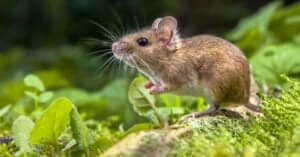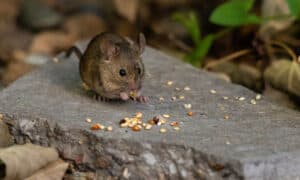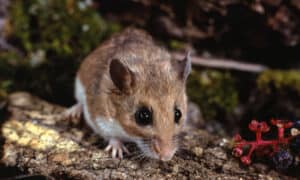Chinchillas are among the cutest animals on the planet. They are highly sought after as pets due to their intelligent personalities, cute little noses, and lustrous soft hair coats. They can make excellent pets in the right hands, but do your research before making an impulse purchase. Chinchillas are active, affectionate animals that make great pets for families willing to give them the attention they deserve; in fact, a chinchilla may become very attached to their family. However, they are not advised for toddlers or young children who may unknowingly handle them roughly.
When you bring home a new chinchilla, the last thing on your mind is probably poop. Chinchillas are adorable beyond words, but their toilet habits are not! The least favorite aspect of owning any pet is dealing with what comes out the other end, which begs the all-important question: what do chinchilla droppings look like? This article uncovers everything you’ve ever wanted to know about chinchilla poop and other interesting facts.
What Do Chinchilla Poop Look Like?
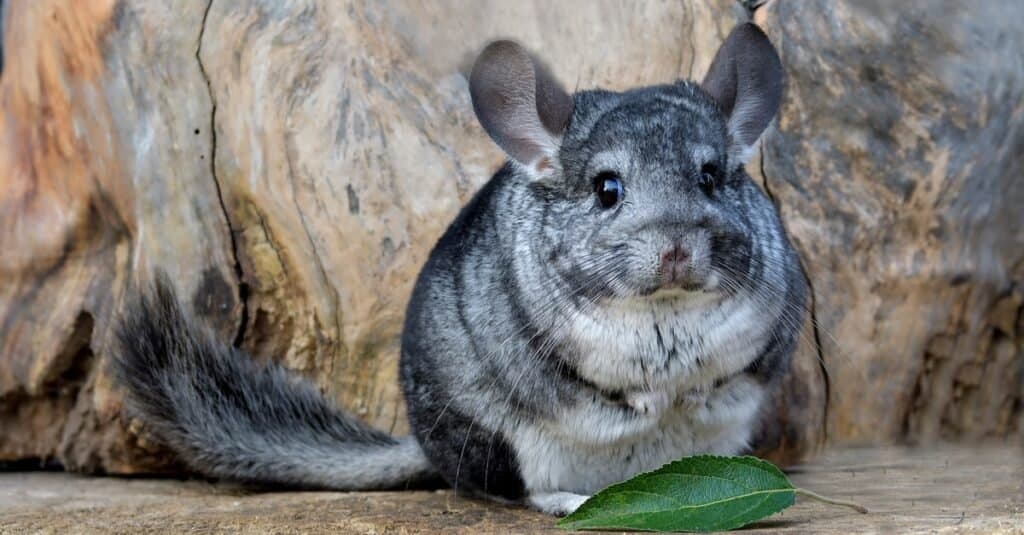
Chinchillas have odorless brown or black poop.
©ATTILA Barsan/Shutterstock.com
Like mice and guinea pigs, chinchillas have small, compact, rounded tubules of odorless brown or black poop. As you clean up the ample amounts of feces from your pet’s cage on a regular basis, you will get a good grasp of what healthy chinchilla poop looks like.
Size
Because of the size of these rodents, chinchilla poop is typically smaller than the diameter of a dime. The size of each pellet varies slightly depending on the chinchilla’s size, and their stool is typically the same size as the pellets they normally eat. If their diet hasn’t changed, the size, shape, and color of their poop should stay the same. It’s a good idea to check the size of their poop on a regular basis to be sure they are not producing irregular-sized ones.
Shape
The strange thing about chinchilla poop is that its shape as it exits the body resembles the pellets that enter it as food! Expect skinny cylinders with rounded ends that are uniformly shaped and sized. If you notice irregular shapes or a stool with holes or missing pieces, this signals something is wrong.
Smell
The great news for all chinchilla owners, or those thinking about adopting one, is that their poop does not stink, and the excrement of these adorable pets is not unpleasant as cats’ or dogs’ poop. In fact, it’s quite small and doesn’t have much of an odor.
Texture
Since chinchillas come from dry environments, they are used to conserving water. Hence, their feces are usually dry and solid.
Quantity
Chinchillas can poop up to 250 times per day (yes, that’s a lot!), so they end up leaving their feces wherever they go. The number of droppings produced is a good indicator of a healthy digestive system and a healthy appetite. Fewer feces indicate that your chinchilla is not eating properly or has digestive issues.
The amount of chinchilla feces is shocking, but it is normal and easy to deal with because it is dry, hard, and not sticky at all. Cleaning up after them should be pleasant because their stool is not as stinky as other pets’.
Why Do Chinchillas Poop a Lot?
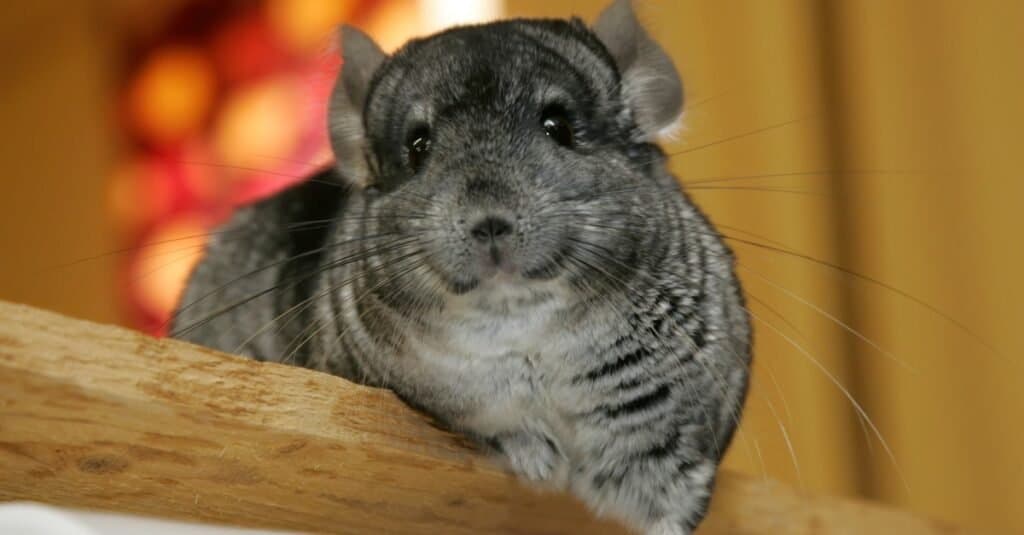
Chinchillas poop about 250 times in a day.
©AJSTUDIO PHOTOGRAPHY/Shutterstock.com
Chinchillas poop a lot because they eat a lot. That’s all there is to it. Chinchillas have earned a well-deserved reputation as poop machines. The chinchilla diet consists almost entirely of low-energy plant matter. Wild chinchillas, like some grass-eating animals such as cows, spend a significant amount of time foraging for and eating food. The same is true for your pet, which you’ve probably noticed spends most of the day eating or sleeping. Because your chinchilla consumes a large amount of food to obtain the energy it requires, it must expel a comparatively large amount of food at the ‘other end.’ It accomplishes this by pooping all of the time.
Furthermore, chinchillas have tiny digestive systems and cannot control their bowel movements. A new chinchilla owner may be surprised to discover that their pet is endlessly pooping, especially if they have never witnessed this animal behavior before. Although chinchillas can be taught to take a dump in designated areas from a young age, teaching them to poop in a specific location is deemed impossible.
Why Do Chinchillas Eat Their Poop?
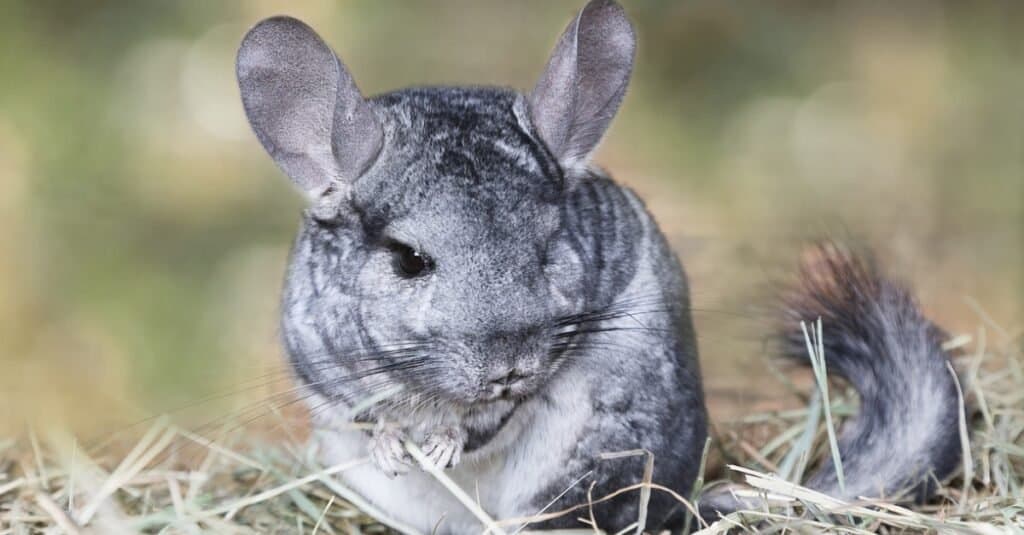
Chinchillas ingest their poop because they contain beneficial bacteria.
©iStock.com/alkir
Chinchillas eat their poop to get more nutrition from it. This helps them maintain their gut flora populations. When a chinchilla poops, the excreted elements are divided into regular poop and cecotropes. Regular poop is simply poop. It’s the remnants from your chinchilla’s food that it didn’t or couldn’t digest.
On the other hand, cecotropes are a type of special poop. The cecum, a small pouch in the intestines, produces them. They are bigger than regular poop because they contain more water and stick together due to their texture. They resemble small bunches of grapes. Cecotropes are not only nutritionally concentrated but they are also filled with beneficial bacteria.
Diarrhea in Chinchillas
Diarrhea in your chinchilla appears to be different from its normal, well-formed feces. A chinchilla’s feces may seem soft or sticky when it’s sick, with a mucus coating. It may also be moister than usual and stink. If you notice that your chinchilla’s feces is gloopy or smelly, take him to the veterinarian as soon as possible. If it is not treated, it may become dehydrated and experience an electrolyte disturbance. Untreated diarrhea can also interrupt his gut’s natural bacterial balance (the “good” bacteria), allowing bacteria to enter his bloodstream and cause septicemia, which can be fatal.
Diarrhea in your chinchilla could be caused by various factors, including incorrect diet, too many treats, or water-borne parasites. Your first clue could be the frequency of bowel movements; when your chinchilla has diarrhea, it has much more excretion than normal.
How to Cure Diarrhea in Chinchillas?
Your veterinarian will assess the best treatment for your chinchilla’s diarrhea based on the cause. Even if parasites are found to be the source of the problem, your veterinarian will prescribe the appropriate medication. Keep in mind that chinchillas can have low levels of giardia in their intestines without being ill.
Only high-quality hay (grass or timothy) should be fed to your pet, and treats and pellets should be discontinued. Your veterinarian may also prescribe alkaline water and digestion medicine, which alter the rate at which food is processed through your chinchilla’s digestive tract. In the event of a bacterial infection, chinchillas are treated with antibiotics. If your pet has a parasite infestation, it will be treated with a dewormer to eliminate all the parasites in its system.
Constipation in Chinchillas
Constipation is regarded as a digestive issue for your chinchilla because defecation finalizes the eating and digestion process. If your pet becomes constipated, it must be seen, diagnosed, and treated by a veterinarian as soon as possible; its health can quickly deteriorate. If its illness isn’t treated right away, he may develop bloat or a prolapsed rectum (in which the last part of your pet’s large intestine slides out of place and swells up out of his anus).
If your chinchilla is unable to defecate, or if his feces is hard, crumbly, smaller than normal, or pointed on the tip, he may be constipated.
How to Cure Constipation in Chinchillas?
Once your veterinarian has determined that your chinchilla is constipated, several medications will be prescribed. If your pet is in stasis, injectable treatments are the order of the day since oral medications may not access his gut until his digestive system starts moving again.
Liquid recovery food may be prescribed to assist your pet in increasing much-needed fluid intake. Your chinchilla might be eager to drink it because it tastes good.
Up Next:
Do Chinchillas Make Good Pets?
Pet Chinchilla Guide: What To Know
What Do Chinchillas Eat? A Guide to Their Diet
The photo featured at the top of this post is © ATTILA Barsan/Shutterstock.com
Sources
- https://chinchillacaregroup.com/everything-about-chinchilla-poop-size-softness-shape-quantity/, Available here: https://chinchillacaregroup.com/everything-about-chinchilla-poop-size-softness-shape-quantity/
- Wag!, Available here: https://wagwalking.com/chinchilla/condition/diarrhea
- Wag!, Available here: https://wagwalking.com/chinchilla/condition/constipation
- LoveMyChinchilla, Available here: https://lovemychinchilla.com/do-chinchillas-poop-a-lot/
- PocketPets, Available here: https://pocketpetsforever.com/chinchillas-eat-poop/
Thank you for reading! Have some feedback for us? Contact the AZ Animals editorial team.



